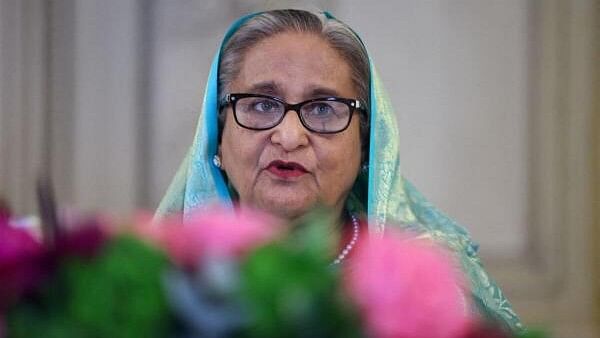
Former Bangladesh prime minister Sheikh Hasina.
Credit: Reuters Photo
New Delhi: India has subtly blamed Sheikh Hasina’s government itself for exacerbating the unrest in Bangladesh, even as the uncertainty over the next destination of the former prime minister of the neighbouring country persisted on Tuesday.
That Hasina only sought and received approval for coming to New Delhi temporarily was made clear by External Affairs Minister S Jaishankar, who made almost identical statements on the situation in Bangladesh in both Rajya Sabha and Lok Sabha.
He subtly criticized Hasina’s government, stating that the “decisions and actions” taken after the July 21 order of the Supreme Court of Bangladesh had “exacerbated the situation”.
Jaishankar conveyed New Delhi’s concerns over attacks on the people of the minority community, their business, and their places of worship in Bangladesh. With the efforts continuing to install a transitional government in Dhaka, India expressed hope that its diplomatic and consular missions in Bangladesh would be protected by the authorities in the neighbouring country.
Given the surge in the unpopularity of Hasina in Bangladesh over the past few weeks, New Delhi is apparently keen to make sure that its engagement with the next government in Dhaka is not stymied by its historic ties with the Awami League and its first family.
There have been considerable tensions, deep divides, and growing polarisation in the politics of Bangladesh after the eastern neighbour of India had its parliamentary elections last January, Jaishankar told both houses of Parliament. “This underlying foundation aggravated a student agitation that started in June this year.
"There was growing violence, including attacks on public buildings and infrastructure, as well as traffic and rail obstructions.
The violence continued through the month of July,” he said, adding, “Throughout this period, we repeatedly counselled restraint and urged that the situation be defused through dialogue. Similar urgings were made to various political forces with whom we were in touch.”
New Delhi has been cautiously and closely watching the evolving situation ever since the students and youths started protests against reservation in government jobs in Bangladesh. It, however, kept its public comments over the past few weeks limited to calling the unrest an “internal affair” of the neighbouring country and wishing for “restoration of normalcy”.
Jaishankar’s statement in Lok Sabha and Rajya Sabha on Monday, however, revealed that New Delhi had advised Hasina to deal with the protesters with kid gloves and to hold talks with the agitating students and youths.
The Awami League government however apparently did not pay heed to the advice from New Delhi. The police crackdown on the protesters resulted in the death of over 250 people across Bangladesh.
“Despite a Supreme Court judgment on July 21, there was no let-up in the public agitation. Various decisions and actions taken thereafter only exacerbated the situation,” the external affairs minister said. “The agitation at this stage coalesced around a one-point agenda, that is that Prime Minister Sheikh Hasina should step down.”
Jaishankar referred to the escalation of violence across Bangladesh on August 4 and the convergence of demonstrators in the national capital despite a curfew. “Our understanding is that after a meeting with leaders of the security establishment, Prime Minister Sheikh Hasina apparently made the decision to resign,” the external affairs minister informed both houses of Parliament.
“At very short notice, she requested approval to come for the moment to India. We simultaneously received a request for flight clearance from Bangladesh authorities. She arrived yesterday evening in Delhi.”
Hasina had left for New Delhi on Monday just about an hour before her official residence ‘Gana Bhavan’ in Dhaka had been stormed by mobs. She had flown by a chopper to a Bangladesh Air Force base and boarded the C130J military transport aircraft, which had landed at the Indian Air Force (IAF) base at Hindon on the outskirts of New Delhi.
Jaishankar took note of the address of the Bangladesh Army chief, General Waker-uz-Zaman, to the nation. “He spoke about assuming responsibility and constituting an interim government.”
